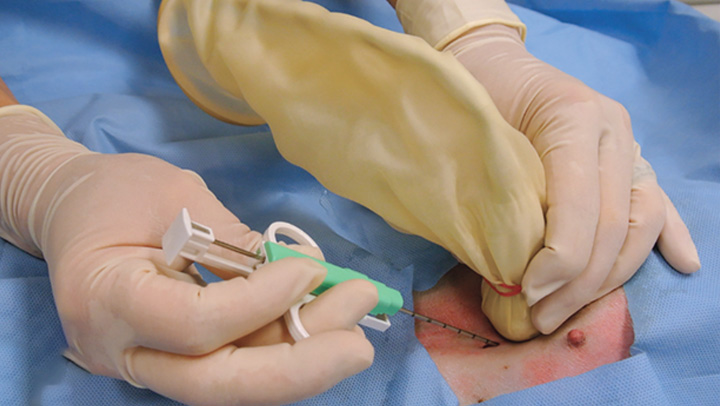

| Product Name | Menghini Liver Biopsy Needle |
|---|---|
Application | Biopsy |
Cannula type | Liver Biopsy Needle |
| Material | Stainless steel 304, 316 |
| Hardness | HRC 30-40 |
Tip | Lancet Point |
Outer Diameter (OD) | 0.737 mm |
Gauge | 21G |
Type of usage | Reusable |
| Options | Sterile |
| Tolerance | +/-0.01mm |
| Manufacturing | Laser Cutting, Grinding |
| Certification | ISO9001:2015, ISO13485 |
Facilities | Grinding Machine, 5 Axis Laser Cutting Machine |
| Package | PP bag or tailor-made packing on request |
The Menghini Liver Biopsy Needle is made from high-quality stainless steels, typically Stainless Steel 304 or Stainless Steel 316. Stainless Steel 304 (AISI 304/SUS 304) is known for its excellent corrosion resistance, good mechanical properties, and ease of fabrication, with a hardness of about 70-90 HRB. Stainless Steel 316 (AISI 316/SUS 316) provides superior corrosion resistance, particularly against chlorides and solvents, making it suitable for more demanding medical applications, and generally has a hardness of 70-80 HRB.
Manners Technology ensures that the materials used meet stringent standards and regulations, providing Material Test Reports (MTRs), Certificates of Compliance (CoCs), and Traceability Documents. These documents detail the chemical composition, mechanical properties, and heat treatment of the materials, and confirm compliance with relevant ASTM F899, ISO 7153-1, ISO 10993-1, or EN standards.
The design of the Menghini Liver Biopsy Needle is typically standardized to ensure safety and effectiveness in clinical use, but Manners Technology offers customized options to meet specific clinical needs or patient conditions.
Our custom Menghini Liver Biopsy Needle features a thin, hollow design with a sharp cutting edge and a Lancet Point tip with a bevel cut. The needle's cutting edges, both inside and outside, are designed to be sharp for effective puncturing and coring of tissue. Additionally, Dove Tail features are incorporated for joining purposes. This needle is designed for percutaneous liver biopsies, allowing for rapid, one-second biopsies that minimize patient discomfort and procedural time.
The tip of the Menghini Liver Biopsy Needle is manufactured through a precision machining process known as needle grinding. This process is used to refine the sharpness and shape of the needle's tip and edges, creating a sharp, precise point with specific geometries such as tapered or beveled tips.
Needle grinding involves several techniques: External Grinding shapes and sharpens the outer surface of the needle, such as the tapered or bevel edge; Internal Grinding smooths and precision-grinds the inner surface of the needle's lumen; and Tip Grinding focuses on crafting the fine, sharp tip using specialized grinding wheels or abrasives. Different grinding steps utilize various machines, including Cylindrical Grinders, Internal Grinders, and Surface Grinders, to ensure the needle meets exacting standards.
The small hole in the tip of the Menghini Liver Biopsy Needle and the dove-tail design at the end are cut using a 5-axis laser cutter. This non-contact process minimizes material waste compared to conventional machining methods.
The 5-axis laser offers exceptional precision and flexibility for creating intricate designs, allowing for customizations based on specific clinical or functional requirements. With positioning accuracy typically ranging from ±0.01 mm to ±0.05 mm (±10 micrometers to ±50 micrometers) and cutting accuracy from ±0.02 mm to ±0.1 mm (±20 micrometers to ±100 micrometers), the 5-axis laser provides extremely high accuracy, ensuring precise control over the needle's dimensions and features.
After laser processing, the Menghini Liver Biopsy Needles undergo electropolishing to enhance their surface quality. Electropolishing is an electrochemical process that removes a thin layer from the needle’s surface, smoothing out irregularities, eliminating burrs and sharp edges, and creating a shiny, mirror-like finish. This finishing process not only improves the appearance of the needles but also boosts their corrosion resistance and overall performance, ensuring a smooth and safe surface crucial for medical applications.
Following electropolishing, the Menghini Liver Biopsy Needles are subjected to ultrasonic cleaning to achieve comprehensive cleanliness.
This process utilizes high-frequency sound waves, typically between 20 kHz and 40 kHz, to agitate a cleaning solution. The ultrasonic transducers produce sound waves that create rapid pressure fluctuations in the solution, forming microscopic cavitation bubbles. When these bubbles collapse, they generate powerful shock waves that effectively dislodge dirt, grease, and other contaminants from the needle surfaces, including small crevices and intricate areas.
This thorough cleaning ensures that the needles are free from machining oils, debris, and particles, and adhere to strict medical cleanliness standards.
If your item has a manufacturing defect in its materials or workmanship, you can return it at any time. We are here to help, please call us for any returns or questions at +86-755-23699351.




